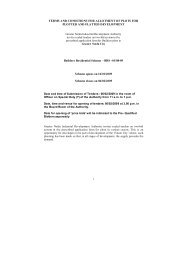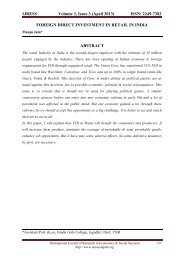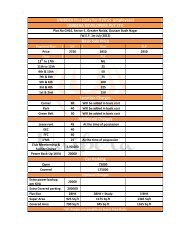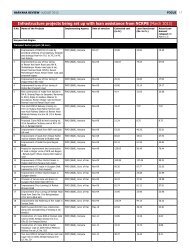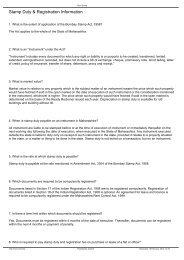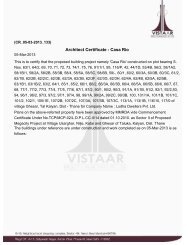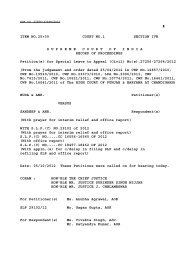eLegalix - Allahabad High Court Judgment Information System ...
eLegalix - Allahabad High Court Judgment Information System ...
eLegalix - Allahabad High Court Judgment Information System ...
You also want an ePaper? Increase the reach of your titles
YUMPU automatically turns print PDFs into web optimized ePapers that Google loves.
JUDGMENT/ORDER IN - WRIT - C No. 37443 of 2011 at <strong>Allahabad</strong> Dated-21.10....http://elegalix.allahabadhighcourt.in/elegalix/WebShow<strong>Judgment</strong>.doPage 169 of 19710/21/2011payment under section 17(3A) must be complied with. As the provision of section 17(1) and section 17(2) cannotbe worked out without complying with requirement of payment under section 17(3A) which is in the nature ofcondition precedent. If section 17(3A) is not complied with, the vesting under section 17(1) and section 17(2)cannot take place. Therefore, emergency acquisition without complying with section 17(3 A) is illegal. This is theplain intention of the statute which must be strictly construed. Any other construction, in my opinion, would lead todiluting the Rule of Law."Hon. Justice Swatanter Kumar took a different opinion and relying on various judgment of this <strong>Court</strong> following theline of Satyendra Prasad Jain it was opined that Section 17(3-A) is not mandatory. Justice Swatanter Kumarfurther held that Section 11-A has no application to the acquisition proceedings under Section 17 of the Act.Following observation were made by Hon. Justice Swatanter Kumar in paragraph 117:"Consistent with the view expressed by this <strong>Court</strong> in the cases referred (supra), I am of the considered view thatthe provisions of Section 17(3A) of the Act are not mandatory. Such a conclusion can safely be arrived at, evenfor the reason that the <strong>Court</strong> would have to read into the provisions of Section 17(3A) consequences and a strictperiod of limitation within which amount should be deposited, which has not been provided by the Legislature itselfin that section. The consequences and contingencies arising from non-compliance of the said provisions have notbeen stated in the Act. Once the land has vested in the Government, non-compliance with the obligation ofpayment of 80 per cent of estimated compensation would not render the possession taken under Section 17(1) asillegal. The land cannot be re-vested or reverted back to the claimants as no provisions under the Act soprescribe. Furthermore, if the interpretation put forward by the appellants is accepted, it would completely frustratetheobjects and purpose of the Act, rather than advancing the same. The expression `shall' used in Section 17(3A)has to be understood in its correct perspective and is not to be construed as suggestive of the provisions beingabsolutely mandatory in its application. Inter alia for these reasons and as per the above discussions, I hold thatthe provisions of Section 17(3A) are not mandatory. They are directive provisions, though their compliance isnecessary in terms of the Act."There being difference of opinion the matter was directed to be placed before Hon. Chief Justice for reference tolarger bench to resolve the divergent views expressed in both the judgments and to answer the questions of lawframed. From the above, it is clear that the issue is yet to be considered by larger Bench of the Apex <strong>Court</strong> onSection 17(3A). However, we are bound to follow the law as it exists today which is a binding precedent underArticle 141 of the Constitution of India. The judgment in Sateyendra Prasad Jain will hold the field hence thesubmission of the petitioner at present that Section 17(3) A is mandatory, non compliance of which vitiate theacquisition can not be accepted.12. Waiver:Shri S.P. Gupta, learned Senior Advocate appearing for the intervenors has submitted that the petitioners afterhaving accepted the compensation under the 1997 Rules, and having not objected to the dispensation of inquiryunder Section 5A of the Act, 1894 they have waived their right to challenge the acquisition.Learned Counsel appearing for the State has also contended that the petitioners shall be treated to have waivedtheir right challenging the writ petition in view of the facts and circumstances of the present cases.Shri S.P. Gupta, learned Senior Advocate appearing for the intervenors, elaborating his submission contendedthat even though the inquiry under Section 5A of the Act, 1894 was dispensed with by invoking Sections 17(1)and 17(4) of the Act, the land owners ought to have objected against the said dispensation and no objectionshaving been filed by the land owners it will be presumed that the petitioners have waived their right to challengethe notifications. It is further contended that the petitioners after having accepted the compensation under the1997 Rules, they shall be treated to have relinquished all their rights against the acquisition. It is submitted by ShriS.P. Gupta, that if there are any grievances of the land owners regarding non-declaration of the amount ofcompensation taken by them they had the remedy to agitate under Section 18 of the Act, 1894. The land whichwas acquired by the Authority was developed and development was made in the knowledge of everyone. Noobjections having been raised, it will be presumed that that the petitioners have waived their right to challenge thenotifications. It is further submitted by Shri S.P. Gupta that certain land owners were also allotted plots/flats under6% allotment scheme of Abadi land which was subsequently transferred by them to other persons.Learned counsel for the petitioners has also placed reliance on the judgment of the Apex <strong>Court</strong> in Commissionerof Income Tax, Calcutta Vs. T.I. & M Sales Ltd., (1987) 3 SCC 132, Rajendra Singh Vs. State of M.P. & Ors,(1996) 5 SCC 460, M.C. Mehta Vs. Unioin of India & Ors., (1999) 6 SCC 237.





